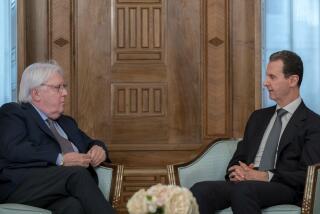Syria’s Assad dubious of U.S.-Russia peace initiative
- Share via
BEIRUT — Syrian President Bashar Assad has expressed skepticism that a planned U.S.-Russian peace conference could help stop the bloodshed in his country, according to an interview published Saturday in an Argentine newspaper.
The Syrian leader also repeated assertions that he had no intention of stepping down from office.
“We have welcomed the Russian-United States rapprochement, and we hope that there is an international meeting to help the Syrians overcome the crisis,” Assad told the Argentine daily Clarin in his first public comments on the U.S.-Russian initiative. “But we don’t think that many Western countries really want a solution in Syria. And we don’t believe that many of the forces who help the terrorists want a solution to the crisis.”
Assad always refers to armed rebels seeking his overthrow as terrorists, a term he repeated many times in the interview.
“We must be clear,” the Syrian president said. “There is confusion in the world about the political solution and terrorism. They believe that a political conference will stop terrorism on the ground. That is not realistic.”
He indicated he would be a candidate in the presidential election scheduled next year.
“To quit would be to run away,” Assad said, taking a verbal broadside at U.S. Secretary of State John F. Kerry’s repeated assertions that he must relinquish his post. “I don’t know if Kerry and others have received a power from the Syrian people to speak in their name about who should go and who should stay.”
Moscow and Washington are backing an international conference, likely to be held next month, aimed at creating a transitional government in Syria. The session follows the terms of an agreement in June at a United Nations-sponsored summit in Geneva.
The U.S. and Russia have been on opposing sides of the Syrian conflict since it erupted more than two years ago. Moscow has been a stalwart ally of Assad, while Washington has backed his ouster. The Kremlin has said the Syrian government is ready to participate in the session.
But the proposed conference faces many obstacles. It is unclear who would represent the opposition. Armed rebels and their exile-based political leadership have insisted that they will not talk to the Syrian government unless Assad’s departure is guaranteed. Washington also insists that Assad must go, a condition that Moscow rejects, as does the government in Damascus.
Moreover, Russia demands that Iran, another close ally of Assad, be allowed to participate in the Syrian peace conference, a position sure to raise objections in Washington.
The Syrian president repeated his position that his government would not negotiate with “terrorists,” a stand that would seem to complicate any effort to bring about direct talks.
“We have a political initiative that includes dialogue,” Assad said, referring to his government’s blueprint for national reconciliation, rejected as not serious by Syrian rebels. “But as for terrorists, no one wants to have dialogue with terrorists. ... A dialogue with political forces, but not with a terrorist who beheads [people], who kills and uses ... chemical weapons.”
The president dismissed allegations that his forces have deployed chemical weapons. “The use of chemical arms in residential areas would kill thousands or tens of thousands of people in a question of minutes,” Assad said. “Who could hide such a significant event?”
Assad made a parallel between U.S. support for Islamic guerrillas in Afghanistan in the 1980s and Western aid for Syrian rebels today. He warned that Washington’s Syria policy, like its actions in Afghanistan, could have unanticipated effects in years ahead.
U.S. officials “supported the Taliban, and on Sept. 11, 2001, they paid a very high price,” Assad said, referring to the Afghan Taliban’s sheltering of Al Qaeda.
Assad spoke in Arabic, but portions of the interview were published in Spanish on Clarin’s website. The Times translated the text from Spanish into English.
The Syrian civil war, based on United Nations figures, has left at least 80,000 dead and forced more than 1.5 million people to flee the country while leaving millions more in Syria homeless.
More to Read
Sign up for Essential California
The most important California stories and recommendations in your inbox every morning.
You may occasionally receive promotional content from the Los Angeles Times.













